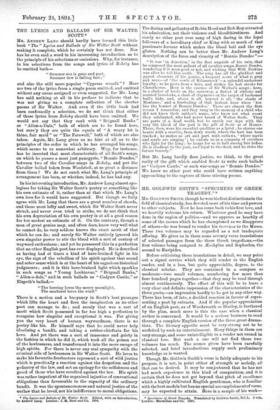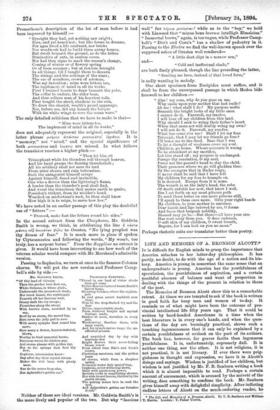MR. GOLDWIN SMITH'S " SPECIMENS OF GREEK TRAGEDY." * MR.
GOLDWIN SMITH, though he won his first distinctions in the field of classical study, has devoted most of his time and powers to other subjects. Now he has come back to his first love, and we heartily welcome his return. Whatever good he may have done in the region of politics—and we approve as heartily of some of the causes which he has championed as we disapprove of others—he was bound to render his Opmripta to the Muses. These two volumes may be regarded as a not inadequate offering. He gives us in them some seventy verse translations of selected passages from the three Greek tragedians,—the first volume being assigned to lEsehylus and Sophocles, the second to Euripides.
Before criticising these translations in detail, we may point out a signal service which they will render to the English reader, and in a less, but quite appreciable, degree, to the classical scholar. They are contained in a compass so moderate—two small volumes, numbering few more than four hundred pages together—that they may be read through almost continuously. The effect of this will be to leave a very clear and definite impression of the characteristics of the three poets,—an impression hardly to be got in any other way. There has been, of late, a decided reaction in favour of repre- senting a poet by extracts. And if the popular appreciation of an English poet, as of Wordsworth or Shelley, is furthered by the plan, much more is this the case when a classical author is concerned. It would be a serious business to read through a complete English version of the three great drama- tists. The literary appetite must be very strong not to be surfeited by such in entertainment. Many things in them are very strange, and some unintelligible to a reader not versed in classical lore. But such a one will not find these two volumes too much. The scenes given have been carefully selected, and brief introductions supply such preliminary knowledge as is wanted.
Though Mr. Goldwin Smith's verse is fairly adequate to his purpose, it is not, in point either of strength or melody, all that can be desired. It may be conjectured that he has not had much experience in this kind of composition, and it is certain that he does not get beyond that pitch of excellence which a highly cultivated English gentleman, who is familiar with the best models but has no special accomplishmentof verse, may be expected to attain. Here is a sample of his work-
* Specimens of Greek Tragedy. Translated by Goldwin Smith, D.C.L. 2 vole. London: Macmillan and 0o. 1893.
Prometheus's description of the lot of man before it had been improved by himself :—
"Eyesight they had, yet nothing saw aright; Ears, and yet heard not ; but like forms in dreams, For ages lived a life confused, nor bricks Nor woodwork had to build them sunny homes, But dwelt beneath the ground, as do the tribes Diminutive of ants, in sunless caves.
Nor had they signs to mark the season's change, Coming of winter or of flowery spring Or of boon summer ; but at random wrought In all things, till I taught them to discern The risings and the settings of the stars ; The use of numbers, crown of sciences, Was my invention; mine were letters too, The implement of mind in all its works.
First I trained beasts to draw beneath the yoke, The collar to endure, the rider bear, And thus relieve man of his heaviest toils.
First taught the steed, obedient to the rein, To draw the chariot, wealth's proud appanage, Nor, before me, did any launch the barque With its white wings to rove the ocean wave."
The only detailed criticism that we have to make is that- " Mine were letters too,
The implement of mind in all its works,"
does not adequately represent the original, especially in the latter phrase 1.41,14ny ciz-eiwrceom gecoucrqdroi gpyciro. It is "memory," not "mind," and the special significance of both poutropcirop and gpyartc are missed. In what follows the translator reaches a higher pitch :—
" Then let him sit Triumphant while his thunders roll through heaven, And his hand grasps the flaming thunderbolt ; All his artillery shall not save its lord From utter shame and ruin bottomless.
Such the antagonist himself arrays Against himself, dread and invincible, One who a fiercer than the lightning's flame, A louder than the thunder's peal shall find, And wrest the truncheon that makes earth to quake, Poseidon's trident, from its wielder's hand.
Wrecked on misfortune's rock, he then shall know How high it is to reign, to serve how low."
We have noted in an earlier passage of this play the doubtful use of "fetters " .- " Proceed, make fast the fetters round his sides."
In the second extract from the Choephoroe, Mr. Goldwin Smith is wrong, we think, in attributing the line >3 xripTcc pfirric oii! 6w/troy .p 30; to Orestes, "No lying prophet was thy dream of fear." It is much more in place if spoken by Clytmmnestra and following the words, " My womb, too truly, has a serpent borne." From the Supplices no extract is given. It would have been interesting to see how work of the veteran scholar would compare with Mr. Morshead's admirable -version.
Passing to Sophocles, we turn at once to the famous Colonus chorus. We will put the new version and Professor Camp- bell's side by side :—
PROFESSOR CAMPBELL.
"Friend in our land of victor steeds thou art come To this Heaven-fostered hannt,Earth's fairest home, Gleaming Colones, where the nightin- gale In cool green covert warbleth ever clear, True to the deep-flushed ivy and the dear Divine, impenetrable shade, From wildered boughs and myriad fruitage made, Sunless at noon, stormless in every gale. Wood-roving Bacchus there, with mazy round. And his nymph-nurses range the un- offended ground.
And nourished day by day with heavenly dew Bright flowers their never-failing bloom renew From eldest time Dfio's and Cora's crown, Clusteriug narcissus, ansl the golden beam Of crocus, while from a sleepless spring
Perennial water duly minisVring, Cephisus, never withering down, Daily with quickening power, Revisits mirth in unpollnting shower. Her wide breast heaves, thrilled by the
gentle stream,
The quiring muses love to seek the spot,
And Aphrodite's golden car forsakes it not."
Neither of these are ideal versions. Mr. Goldwin Smith's is the more lively and popular of the two. But why "luscious Ma. GOLDWIR SMITH.
"Of this land of chivalry Thou the garden here dost see, White Colons, in whose glade, Underneath the greenwood shade, Her loved haunt, the nightingale Poureth oft her luscious wail. Glossy-dark the ivy creeps ; Flourishes along the steeps With berries store, scorched by no ray, Bent by no storm, the sacred bay. Here loves the jolly god to rove With merry nymphs that round him move.
Here many a flower, heaven-watered, blows, Worthy to bind immortal brows. Narcissus waves its clusters gay, And croons gleams with golden ray. Nor do the springs that feed thy flow, Oephisns, intermission know : Day after day their crystal stream Makes the rich loam with plenty teem.
Nor do the muses keep afar,
Nor Aphrodite's golden car." wail" for Alysia potipergs? while as to the "bay," we hold with Linwood that " minus bene laurunt intelligit Elmsleius." " Immortal brows," again, is too vague, while Professor Camp- bell's " Deco's and Cora's " has a shadow of pedantry in it. Passing to the Electra we find the well-known speech over the
supposed ashes of Orestes well rendered-
" A little dust clipt in a narrow urn," and-
" Cold and ineffectual shade,"
are both finely phrased, though the line preceding the latter, " Sending me here, instead of that loved form," is sadly wanting in melody.
One short specimen from Euripides must suffice, and it shall be from the unsurpassed passage in which Medea bids farewell to her children :- " Alas' my sons, why do you gaze on me,
Why smile upon your mother that last smile?
Ah me ! what shall I do ? My purpose melts Beneath the bright looks of my little ones.
I cannot do it. Farewell, my resolve.
I will bear off my children from this land.
Why should I seek to wring their father's heart When that same act- will doubly wring my own?
I will not do it. Farewell, my resolve.
What has come o'er me ? Shall I let my foes Triumph, that I may let my friends go free ? I'll brace me to the deed. Base that I was To let a thought of weakness cross my soul.
Children, go home. Whoso accounts it wrong To he attendant at my sacrifice, Let him stand off ; my purpose is unchanged.
Forego thy resolution, 0 my soul, Force not the parent's hand to slay the child.
Their presence where we go will gladden thee.
By the avengers that in Hades reign, It never shall be said that I have left My children for my foes to trample on.
It is decreed. Escape from it is none.
The wreath is on the lady's head, the robe Of death enfolds her now, that know I well.
Ere I set forth on my most piteous path To send these babes on one more piteous still, I'll speak to them once more. Give your right hands My children, to your mother to embrace.
Dear hands and lips beloved by me, 0 forms And faces that bespeak nobility, Blessed may ye be.—But there—all here your sire Has rent away from you. 0 dear embrace, O soft skin of my children, 0 sweet breath, Begone, for I can look on you no more."
Perhaps rhetoric snits our translator better than poetry.



































 Previous page
Previous page